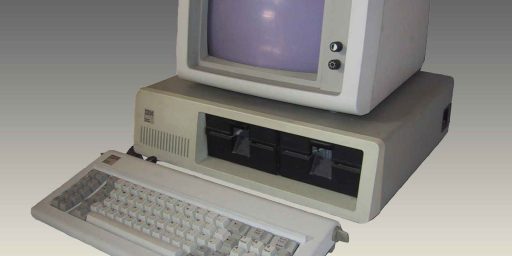Big Changes Coming for Cellphone Industry
New TI chip combines cellphone functions (IHT-NYT)
Texas Instruments was expected to announce Monday that it had integrated most of the computing functions of a mobile phone onto a single microchip, an innovation that may lead to lower manufacturing costs and improvements like longer battery life and higher data transfer rates. The company plans to have the new semiconductor widely available by the middle of 2006, making it the first major manufacturer to produce an integrated cellphone chip for the mass market, according to industry analysts.
At present, the components of a mobile phone include numerous specialized chips that control such functions as sending and receiving radio frequencies, managing power and overseeing the phone’s basic computing functions. “This isn’t an incremental step,” said Bill Krenik, manager of wireless advanced architectures for Texas Instruments. “It’s a big leap forward.” Texas Instruments is not the only company to have integrated much of that technology on a single chip. Qualcomm has also developed integrated technology. But its product may reach the mass market somewhat later than the Texas Instruments technology, said Alex Slawsby, an industry analyst with IDC.
The newest technology integrates two basic chips: the one that controls sending and receiving radio frequencies and the one that controls basic computing functions, Krenik said. Despite the advances toward integration of functions onto a single chip, some will remain separate. Specifically, the major chip makers have not yet figured out how to economically integrate memory, now provided by a specialized chip that stores phone numbers and other information.
Interesting.
Update (0944): WaPo has a related story, Scrambling For a Slice Of Internet Phone Pie
Investors showed little interest when Richard M. Tworek started setting up Internet-based phone systems for businesses two years ago. Now the company that Tworek founded, Qovia Inc., has $16.1 million in venture capital and 120 businesses use its software to make sure their Internet connections stay robust enough for calls to go through glitch-free. But last week the Frederick company laid off 16 of its 59 employees and retooled its business plan. Like Qovia, most Washington area companies in the Internet phone business are relatively small and still searching for a secure and profitable niche in a fast-changing sector. They range from start-ups that provide behind-the-scenes support for the technology to alternative phone providers, such as Primus Telecommunications Group, that sell Internet calling plans directly to consumers.
Most are counting on predictions that the technology known as VoIP, or voice over Internet protocol, will take off this year. But a boom could cut both ways. The local companies could benefit from increased demand, but analysts say they also will face heightened competition from communications industry giants. “Once the big guys come into the market, it’s game over for the small guys,” said Jon Arnold, a Toronto-based analyst with Frost & Sullivan, a market research firm. He predicted that a handful of carriers will dominate the consumer market. The situation may be less dire for software companies providing the technological underpinnings of VoIP systems, he said. But they will have to compete against big equipment-makers such as Cisco Systems Inc. and Nortel Networks Corp.as well as international rivals. “There’s only room for two or three vendors in each niche,” Arnold said.
The number of consumers using VoIP is expected to grow to about 4 million by year-end from about 800,000 today, according to Frost & Sullivan. The growth may be driven by major communications companies such as cable giant Comcast Corp., which this month announced plans to offer Internet calling to as many as 20 million homes this year and another 20 million by the middle of 2006. The percentage of business phone lines that make connections over the Internet is expected to grow to 13.1 percent by the end of 2006 from 7.2 percent today, the research firm said. Major corporations such as Ford Motor Co. and Boeing Co. already have traded at least part of their traditional phone system for Internet-based networks. “Internet phones have hit the big leagues,” Tworek said. But to stay in the game, Qovia last week cut its staff and changed its marketing to concentrate exclusively on businesses with 10,000 or more employees and a comparable number of phone lines, more than double the size of its average client today. Tworek, who declined to discuss the privately held company’s finances, said the cost of marketing to small and mid-size businesses was too great for the payoff in revenue.






Just the other day I was reading an article, I believe it was in the WSJ or something similar that said consumers weren’t signing up for VOIP service in numbers that the industry was expecting. Basically it was too much bother for most and they are essentially happy with their current setup and couldn’t be bothered to make the switch, unless they made an unusually large number of long distance and overseas calls. To me, VOIP is a nice idea but right now requires too much work to set up and maintain.
Take a look at Sunrocket http://www.sunrocket.com. I just signed up with them. A box plugged inbetween my cable modem and router, a regular telephone plugged into the box, and I can make unlimited local and long-distance phone calls for $25 a month or $200 a year.
So far the only problem so far is that about %50 of the time the call sounds a little echo-y or scratchy.
And we actually signed up because we make so few phone calls that the $40 or more we were paying for local+basic long distance seemed ridiculous, and we’d rather do this than go cell-only.
We love our VOIP setup. We use Packet8 and it’s $20/month for unlimited nationwide. We’ve never had any service or quality problems and the only time the sound quality goes down is when I’m already using up all the bandwidth with a heavy download or upload.
I also chose them because I wanted a VOIP box that sat right on my home network and NOT between my cable modem and the Internet or the cable modem and my network. I have enough latency without adding another box with a weak processor in it.
Before having VOIP we hadn’t had a land line in 4 years, using only cell. Now we’ve dropped our cell phones and use only the VOIP. I must say, getting rid of the cell phones was a great move.
How does your VOIP work in your car? 🙂
Is Packet 8 one of these setups that use a router?
Suprisingly, I don’t miss having a cell phone in the car, and especially don’t miss having it while out and about doing errands. So I guess the VOIP works well in those places 🙂 Maybe in 5 or 10 years when cars are internet enabled, I’ll have the same VOIP account routed to the car as well.
Packet8 has a box that sits on my local network, just plug in the ethernet, the regular phone and it was basically ready to go. It had no problems with getting through my linux box/firewall or my linksys router when I tried that configuration.